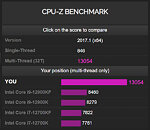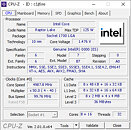TheLostSwede
News Editor
- Joined
- Nov 11, 2004
- Messages
- 18,348 (2.46/day)
- Location
- Sweden
| System Name | Overlord Mk MLI |
|---|---|
| Processor | AMD Ryzen 7 7800X3D |
| Motherboard | Gigabyte X670E Aorus Master |
| Cooling | Noctua NH-D15 SE with offsets |
| Memory | 32GB Team T-Create Expert DDR5 6000 MHz @ CL30-34-34-68 |
| Video Card(s) | Gainward GeForce RTX 4080 Phantom GS |
| Storage | 1TB Solidigm P44 Pro, 2 TB Corsair MP600 Pro, 2TB Kingston KC3000 |
| Display(s) | Acer XV272K LVbmiipruzx 4K@160Hz |
| Case | Fractal Design Torrent Compact |
| Audio Device(s) | Corsair Virtuoso SE |
| Power Supply | be quiet! Pure Power 12 M 850 W |
| Mouse | Logitech G502 Lightspeed |
| Keyboard | Corsair K70 Max |
| Software | Windows 10 Pro |
| Benchmark Scores | https://valid.x86.fr/yfsd9w |
More details of Intel's upcoming Raptor Lake CPUs have tipped up online, as someone submitted the results of a CPU-Z benchmark to the CPU-Z database. The CPU in question is most likely one of the by now, many ES samples of what should be the Core i9-13900K, which means the multiplier is still limited to 50x, which means the clock speeds can't go beyond 5 GHz. Even so, the extra E-cores helps it best the Core i9-12900K in the multithreaded test over 1400 points, using the average results for all 12900K CPUs in the database. It's also faster than the average Core i9-12900KF in the single-threaded test, but it doesn't quite manage to beat the Core i9-12900K results here.
The test system was admittedly not the very best possible hardware, as an MSI Pro Z690-A DDR4 motherboard was used and the CPU was paired with 32 GB of CAS19 DDR4 2666 MHz memory, so there's clearly potential for improvement here. The test system was also using Windows 10, which is potentially another bottleneck when it comes to taking advantage of all the extra E-cores. The E-Cores reached a top speed of 2.99 GHz, with the P-cores peaking at 4.99 GHz. The CPU was hitting 100 degrees C during the test, which suggests that some serious cooling is going to be needed for these CPUs. Intel is likely to reveal its Raptor Lake CPU's during the Intel Innovation '22 event in San Jose, which kicks off on the 27th of September.


View at TechPowerUp Main Site | Source
The test system was admittedly not the very best possible hardware, as an MSI Pro Z690-A DDR4 motherboard was used and the CPU was paired with 32 GB of CAS19 DDR4 2666 MHz memory, so there's clearly potential for improvement here. The test system was also using Windows 10, which is potentially another bottleneck when it comes to taking advantage of all the extra E-cores. The E-Cores reached a top speed of 2.99 GHz, with the P-cores peaking at 4.99 GHz. The CPU was hitting 100 degrees C during the test, which suggests that some serious cooling is going to be needed for these CPUs. Intel is likely to reveal its Raptor Lake CPU's during the Intel Innovation '22 event in San Jose, which kicks off on the 27th of September.


View at TechPowerUp Main Site | Source




 Doesn't sound like a safe "daily driver" non hydrogen setting.
Doesn't sound like a safe "daily driver" non hydrogen setting.

